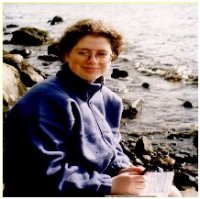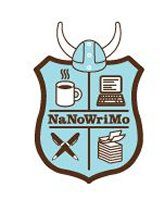Interview with author and NaNoWriMo organizer Grace Tierney
 Grace Tierney is a mother and writer living in rural Ireland. Her excellent blog, Wordfoolery, examines rare and unusual words in the English language.
Grace Tierney is a mother and writer living in rural Ireland. Her excellent blog, Wordfoolery, examines rare and unusual words in the English language.
Grace is a prolific writer, working on both novels and short stories. I had the good luck to meet Grace (virtually) when we became critique partners, and I’ve enjoyed getting to know the characters in her stories, set against the backdrop of rural Irish towns.
Since 2007, Grace has been a decorated National Novel Writing Month (NaNoWriMo) “veteran”. And in 2009, Grace became the regional organizer of the Ireland North East region for NaNoWriMo, providing support and assistance to NaNo participants in her area.
I wrote an earlier post about the 2012 NaNoWriMo challenge. Now, with the international month-long writing marathon just wrapping up, I thought it would be a good idea to ask Grace about the process, her NaNo project, her role as a regional organizer, and what writers can do to best prepare for the writing challenge in November 2013. Over to Grace…
Grace, thanks so much for joining me! What was your project for NaNoWriMo 2012? Did you met the fifty thousand word goal?
Hi everybody!
My novel for NaNo 2012 was “The Light Keeper’s Diary” – a women’s fiction novel with two strands – one following a heroic lighthouse keeper in 1917 and a second set in contemporary Ireland where Dervla, a work-obsessed historian writing a book about Ireland’s lighthouses, comes across the light keeper’s diary. She finds herself falling for the keeper thanks to his diary, but is also drawn to a local stone sculptor in the present day.
Yes, I made it to 51,800 words. That’s my fourth NaNoWriMo win.
 You mentioned to me that NaNo is a great opportunity to try out new genres. Why is this? Have you done this yourself?
You mentioned to me that NaNo is a great opportunity to try out new genres. Why is this? Have you done this yourself?
I think it’s a perfect time to experiment with your writing, be that a new genre, a new length, or style. It’s only one month, so even if you find that you hate the new genre, you haven’t wasted a long time reaching that conclusion. It’s a good time to challenge yourself.
I generally write women’s fiction/chick-lit because I love incorporating humour and relationships in my stories. Last year I was particularly busy in my non-writing life but I really wanted to still do Nano. I chose to write a children’s story for my own kids. To cut down on research I used them as the model for the main characters and set it in a place we know well. I had a blast writing it and while I don’t think I’ll become a children’s writer, I’ve found myself including younger characters in my work since then. My children, and god-children, loved the finished product which I had properly printed using the CreateSpace offer to Nano winners (5 free copies printed just for postage costs).
This year I tried another new genre, by including the historical fiction strand of my story. This was trickier because it required so much research. I’ve been researching lighthouse history for years (I have a passion for Ireland’s coastline) but I still have sections of the novel that will require “fixing” later with accurate historic details. I loved writing the 1917 sections as much as the 2012 sections. I will definitely explore this genre more in future. Or should that be past?
 How much prep work do you do prior to NaNo (e.g. outlines, research, etc.)? How do you maintain your daily writing schedule?
How much prep work do you do prior to NaNo (e.g. outlines, research, etc.)? How do you maintain your daily writing schedule?
The amount of prep I do varies wildly. In 2007 I was still outlining in week two of Nano (not a good idea).
One of the writers in my region (my wrimos) laughs that each year at the Kick Off session I claim to have an unfinished outline and I should just relax because I still make it to the finish-line. She may have a point. I always have a title, a genre, setting, a good idea of the main characters and the ending. Beyond that I prefer to have 2-3 sentences for each chapter in my outline so that I never start a day without knowing, roughly at least, what I’m going to write. I always include non-fiction chapter headings in my work and I will usually have those lined up in advance. For example, in my novel about best friends starting a hangover-recovery company each chapter starts with a hangover cure. My children’s story had the kids treasure-hunting so each chapter starts with information about the finding of famous Irish artifacts (I call this education by stealth!).
Having said all that, this year I had only a third of my story outlined in advance because of my father’s serious ill health during October. I had to develop the plot as I went along and lost plenty of writing time as a result.
I wish I had gems of wisdom on how to keep writing every day during November but I think it comes down to personal commitment and a stubborn inability to give up. Every year I see writers stop after a few days and it’s a shame. There will always be reasons – illness, work pressures, family issues, Thanksgiving – but winning Nano comes down to putting all the minor time-stealers aside. I don’t watch much TV for a start. In past years I’ve asked my husband to hide our internet modem for the first week. I let all my friends know that I’m unavailable for social outings. I stock my freezer in advance, so I have less cooking to do for my family. The ironing piles up and weeds are ignored in my vegetable plot. Every bit of prep for Christmas gets pushed into December.
That all helps, but really it’s about saying you’re doing this, and then doing it.
Catching up from behind is tricky during November so I aim to write 2,000 words each day (1,667 is the recommended amount) which means that when my young children get ill during November (and yes, that ALWAYS happens) I have a day or two in hand to cope with it. I usually plan a couple of days off too, so I don’t lose my marbles completely. I find that I can write 2,000 words in about two hours, but that varies for every writer. In fact, learning that I could do that was one of the best things Nano has taught me.
 How did you start out as a regional organizer and what are your responsibilities?
How did you start out as a regional organizer and what are your responsibilities?
I had done (and failed to win) Nano twice in 2007 and 2008 but sensed I could make it to 50K if I was better organised. I was struggling to find a local writers’ group or meet other writers. Nobody was covering my region, so I just applied online. All you really need is enthusiasm for the event and some basic organising skills. I began in 2009, under mentorship by another Irish ML, by spreading the word everywhere I could imagine – library notice-boards, emailing lists, local papers etc. I got a handful of writers participating that year and I finally won Nano myself. This year we had 328 writers registered in our region, with 22 actually writing and 59% of those won the challenge which is amazing as internationally the win-rate is just 18%. I am so proud of the writers in my region. We’ve had winners as young as 15 and I’ve made some wonderful friends through the write-ins.
As ML (municipal liaison) I host a Kick Off event, at least one write-in per week, and a TGIO party (Thank Goodness It’s Over). I also have to send one email a week to our writers to encourage them and moderate our forums on the Nano site. I love writing the pep emails and several of my writers, erroneously, believe that I’ve helped them to win Nano with my advice and cheer-leading. About 10% of my writers come to the in-person meetings, so they’re far from compulsory but they are good fun, positive, and supportive. It’s strange to write in company with other writers in the lobby of our local hotel, but it has always helped my word-count and in November that’s crucial!
I’m hoping to expand our events next year by adding a Plot Party to help us all outline and plan. Some wrimos want me to host an all-night write-in too, but I’m not sure I can stay awake for that one so I may delegate it to a wrimo who drinks coffee.
 As a regional organizer, do you find that the support of a local group helps writers to meet their goals?
As a regional organizer, do you find that the support of a local group helps writers to meet their goals?
Yes, a hundred times, yes.
This year I’ve come across people saying online that write-ins are pointless and I disagree massively with that opinion. Our meetings are very positive and friendly. I’ve seen teenage writers inspire older writers to try new genres. I’ve gotten great advice on Glasgow slang from another wrimo’s brother and mechanical information from a wrimo’s husband. Wrimos swap details of likely agents for their work. People commiserate on low word-counts and encourage each other to keep going. Last year I took a writing dare at a write-in – this is an unseen thing you have to include in your novel – I was dared to include myself as a cameo character in my story. It was my kids’ story so I wrote my 9 year old self into the story – this is the only way my kids and I could ever play together as peers and it worked brilliantly in the book. I would never have thought of it myself.
In my experience, writers that come to the local meetings do significantly better in Nano than those who stay at home. Plus we have a lot more fun.
What would be your advice to writers thinking about participating in NaNo 2013?
Go for it!
Even if you’ve written for years I think you will learn something new about your writing during Nano.
Plot as much as you can during October. Even if you’re a seat-of-your-pants writer – you can still get to know your main characters in advance, map a setting, or do research.
I strongly recommend going to the Kick Off and write-ins, because writers that do have a much higher success rate, and more fun. If Nano is about writing, it’s also about having fun with your writing.
Thanks again for joining me, Grace, and for sharing your NaNo experience with us! And congratulations to you and all the NaNo writers who met the fifty thousand word challenge this year. For those of you eager to participate in 2013, check out the NaNoWriMo site … and start brainstorming.
[…] guest blogging at Kimberly Sullivan’s excellent travel and writing blog today. She quizzed me about […]
[…] Wordfoolery – My cup runneth over. Ireland-based writer Grace Tierney is yet another amazing critique partner and I enjoy reading both her short stories and novel chapters and her interesting blog that explores unusual words in the English language. If you missed my NaNo interview with Grace, who offers plenty of useful tips and advice, read it here. […]
[…] Last year, I interviewed talented Irish writer, Grace Tierney, who is a a regional coordinator for NaNo each year. For those of you interested in learning more about NaNo, or considering participating yourself next year, I suggest you take a look at Grace’s interview here. […]
[…] this year (and those of you simply interetsed in the challenge as I am), be sure to take a look at an interview I did in the past with author Grace Tierney – a multi-year participant in NaNo, and a regional organizer for Ireland. Grace offers […]
[…] so, I suggest you take a look at an earlier post in which I interviewed Grace Tierney, regional NaNo Coordinator for Ireland. Grace provides lots of great tips and inspiration for those hoping to join the annual writing […]